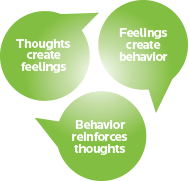Life Happens…When it does, Brief CBT May Be Exactly What You Need
Different life events we encounter, like losing a parent, receiving a medical diagnosis, gaining weight, or adjusting to a new job or kids flying the nest. Any one of these types of life events can create a sense of anxiety, depression, and other negative feelings that can be challenging to manage. For example, experiencing stress due to a medical diagnosis or depression while grieving the loss of a loved one may not require the level of treatment one may need for a chronic mental health condition. That’s the beauty of Brief CBT.
What is Cognitive Behavioral Therapy?
Cognitive Behavioral Therapy (CBT) is a powerful type of talk therapy (psychotherapy). The basic premise of CBT is that emotions are difficult to change directly, so CBT targets emotions by changing the thoughts and behaviors contributing to distressing emotions.
CBT builds a set of skills that enables you:
- Identify how situations influence your thoughts and behaviors
- Become aware of the connection between your thoughts, behaviors, and emotions
- Improve your emotional well-being by changing unhelpful thinking and behaviors
Brief CBT is meant to concentrate on just one or two issues over the course of four to eight sessions, while CBT for more complex matters can take 12 to 24 sessions.
How Brief CBT Works
- Identification: This step aims to identify the source of negativity in your life.
- Raising Awareness: After the source of negativity has been identified, we’ll work together to help you become aware of how the source negatively affects the different aspects of life.
- Identifying Responses: How are you reacting to the sources of stress, anxiety, and negativity?
- Fixing the Behavior: This involves allowing the patient to find and change the negative thoughts and behaviors associated with the problem.
- Moving Forward: CBT does not only seek to solve the problem at hand. It also involves equipping you with the tools to help with future issues.
Contact our office to learn more if you think you may benefit from Brief CBT.
If we change what we’re thinking and/or change what we’re doing, we can change how we’re feeling. – Dr. Michelle Pearce









